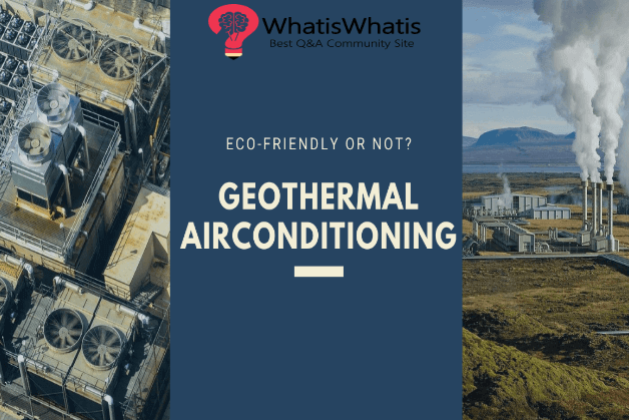A geothermal air-conditioning system offers similar cost and environmental benefits, whether you are using it in a residential or commercial building. Geothermal technology utilizes the stored energy underneath the surface of the Earth for heating and cooling your home or office. This makes the system longer-lasting and more effective than other kinds of HVAC equipment available nowadays.
Know more: 10 Ways to cool Your Home During the Summer Season
Reasons to Choose Geothermal Air-conditioning
It Saves Energy
The energy savings offered by the geothermal air-conditioning system is the primary reason why you should consider this technology. For example, geothermal heat pumps decrease energy costs by thirty to seventy percent on average.
Thus, homeowners can usually recoup the installation cost in five to seven years through energy savings. The US Environmental Protection Agency states that the geothermal heating and cooling system offers the lowest cost throughout its lifespan compared to conventional ones.
It Provides Cooling and Heating
Geothermal technology has several applications around the house. Aside from providing energy-efficient cooling, it can also be used for supplying both heating and cooling.
For example, a geothermal heat pump can be used for heating water and pool. A geothermal heat pump as a cooling and heating system can reduce or eliminate maintenance expenses because of the fewer parts prone to breakage.
See more: Why Glass Side Tables Are Essential for Functional & Elegant Home Interior
It Constantly Produces Cooling
Geothermal air-conditioning systems are steady in their production, compared to other forms of green or eco-friendly energy technologies. The solar-powered cooling and heating system, for instance, collects energy only during the peak sunlight hours.
On the other hand, the wind-powered system works only during windy days. Due to the steady temperature underground, geothermal systems operate all the time. Since they can transfer energy at all times, these systems are suitable for residential heating and cooling.
It is Energy-Efficient
Several homeowners and business owners aim at decreasing their carbon footprint and using energy-efficient systems. That is why they opt for very energy-efficient cooling systems on the market like a geothermal heat pump.
Geothermal systems are typically 400% more energy-efficient than traditional oil or gas furnaces. In general, approximately 70% of the energy produced by the system is from renewable resources.
It is Durable and Requires Less Maintenance
The major parts of a geothermal air-conditioning system are underground and usually come with warranties of up to fifty years. For residential applications, the heat pump unit can last up to 25 years. Geothermal systems typically require fewer maintenance services than traditional air-conditioning systems.
Disadvantages of Geothermal Air-conditioning
Limited Availability of Services
The eco-friendly geothermal cooling system is not always a choice for your home. In several communities, there may be no qualified contractors for it at all. This disadvantage will be more likely experienced if your residence is located further north.
The proper installation of the system’s loops is important to its success, so you generally cannot install it on your own. Some communities may not provide zoning for this system.
High Capital Cost
The initial cost of a brand-new geothermal air-conditioning system can be high. The final cost varies depending upon the accessibility and size of your property, and whether or not vertical loops need to be installed.
Many homeowners may encounter an increased cost due to their soil conditions. If there is a layer of rock near the soil surface, drilling and digging become more expensive.
Experienced Contractor Required
If you are a handy person who likes installing stuff at home on your own to save bucks, then the design of a geothermal cooling system will not enable you to do so. An experienced contractor is needed in almost all situations.
The ground loops should be installed in a certain manner to maximize their potential in transferring temperature. Other things to consider are the connections to your house and the indoor equipment to be installed.
Building Code Restrictions
The community you live in might not allow the installation of geothermal air-conditioning systems. This restriction may be because the local building code is not updated or the soil condition is not suitable for this technology.
Before starting to buy supplies for this work or hiring a qualified contractor, you need to first discuss this option with your local zoning authorities and secure any needed permits for this project to avoid conflicts later on.
Ample Space Allocation
To be functional, the ground loops need a certain amount of space. They can be horizontally installed at a depth of at least 4 feet if a wide, open space is available in your property. You can instead opt for a vertical installation if your property is of limited size and no obstacles will affect the drilling.
Possible Landscaping Problems
A geothermal air-conditioning system can ruin your landscape at home significantly. Therefore, the installation is usually recommended for new construction because you will not have to disrupt your yard for the installation of the loops.
You can expect digging up the same area several times throughout the lifespan of your property since the heat transfer technologies will need to be replaced once in every 15 years or so.
Depth Needed for Vertical Systems
Contractors prefer the horizontal systems since only a 6-feet trench is required for their installation. If your area is limited and you need to choose a vertical system for the loops, a pair of approximately 400-feet deep and 2-feet wide trenches will be required to cool or heat the average house.
It may be challenging to find an experienced contractor to install it since the said depth needs extensive drilling. Besides, there may be soil quality issues to deal with when you go that deep beneath the ground.
The benefits and downsides of a geothermal air-conditioning system should be carefully reviewed since this technology will not be efficient in light soils. The installation cost can be high and the needed space can be significant for it to work properly. This eco-friendly cooling system might be ideal for your house if you can go beyond its initial drawbacks.



Leave a comment